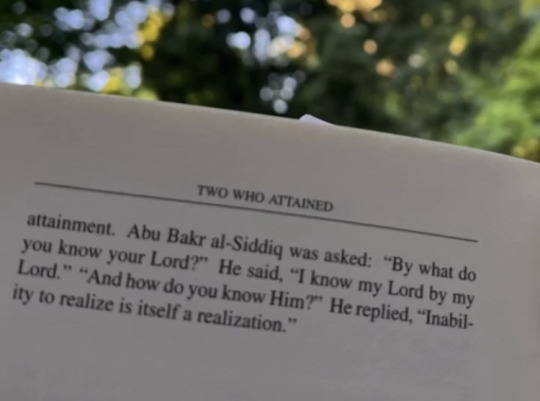#abu bakr
Text
Du’aa made by Abu Bakr when being praised (or insulted):
اللهمَ اجْعَلْنِى خَيْرًا مِمَّا يَظُنُّونَ
O’ Allaah, make me better than what they think of me.
وَاغْفِرْ لِى مَا لَا يَعْلَمُونَ
And forgive me for what they do not know about me.
وَلَا تُؤَاخِذْنِى بِمَا يَقُولُون
And do not take me to account for what they say about me.
● {Ibn Hajar’s al-Isaaba (v. 2, p. 335)}
#abu bakr#sahabah#companionship#sunnah#nabi muhammad saw#prophet muhammad#muslim#allah#islamicreminders#deen#dawah#tawakkal#allahuakbar#deenoverdunya#muslim ummah#islamification#jummah#jummablessings#ramadankarim#ramadan#ramazan#ramadhan#islamic knowledge#islamicquotes#islam#muslim reminder#one ummah#islamic jihad#allah is kabir#salah
10 notes
·
View notes
Text
He who builds a masjid in the way
of Allah, God will build a house for
him in the paradise.
(Abu Bakr)
25 notes
·
View notes
Text

#complaints#secret to happiness#happiness#life lessons#muslim#islam#muslimah#islam help#muslimah motivation#islamic saying#islamic quote#deen#islamic#islampost#abu bakr
9 notes
·
View notes
Video
youtube
Al-Razi: Islam’s Favorite Heretic
Many centuries ago, in the heart of one of Islam’s great empires, there lived a man who openly questioned the foundations of the Islamic faith. He outraged religious thinkers of his time, he mocked sacred scriptures, rejected religious authority, even denied the prophethood of Muhammad himself.
If he were alive today, he would be condemned as a heretic, maybe even an apostate. He would risk professional ruin, social dishonor and exile, even mob violence. In some countries, his views would lend him a sentence of death.
And yet, in his time, this man lived a long and happy life, greatly respected. What’s more, today he is celebrated all over the Muslim world, his heresies forgotten.
This is the secret history of Abu Bakr Al-Razi - the Physician.
Al-Razi was born in the 9th century, in the city of Rayy, located in what is now Iran. A curious and analytical thinker, al-Razi’s exceptional medical talents quickly won him respect and renown.
He was the first to distinguish between smallpox and measles; and the first to write a medical manual for the home. A practitioner and a teacher, his lectures attracted scores of eager learners.
And he wrote mountains of books -- over 200 -- including the 23-volume Comprehensive Book of Medicine which was studied around the world for centuries, and what was perhaps the very first book on Pediatrics.
A superb and innovative clinician, Razi reasoned into practices that would become standard today, like keeping detailed documentation of characteristics and treatment of hospital patients (a form of today’s case records), and using a control group in an experiment.
Razi also had an intuitive understanding of the role of hygiene and the environment in health. It is said that when it came time to build a new hospital in Baghdad, Razi was asked to choose the location. He had fresh meat hung throughout the city. A few days later, Razi returned to check each location, and decided that the hospital should be placed where the meat had putrefied the least.
Confident in his skills, Razi wasn’t afraid to provoke.
He authored a critique of Greek masters such as Galen at a time where orthodoxy was the rule and such authorities were to be studied with submissive reverence, not challenged.
But al-Razi was not a believer in the untouchability of “authorities” - he was instead, a believer in human reason. Thus, to Razi even giants like Galen could -- and in fact should -- be questioned.
“It grieves me to oppose and criticize the man Galen from whose sea of knowledge I have drawn much,” said Razi. “Indeed, he is the Master and I am the disciple. Although this reverence and appreciation will and should not prevent me from doubting, as I did, what is erroneous in his theories. and if he were alive, he would have congratulated me on what I am doing. I say this because Galen's aim was to seek and find the truth and bring light out of darkness.”
So it’s no surprise Razi found himself frustrated with those who blindly accepted dogma in other realms, especially faith. Fortunately for Razi, in the ninth century, “Islam” as we know it today was still being actively formed.
Only two centuries after the death of the Prophet, it was a time when the hadith -- the source of much of Islamic doctrine -- were still being gathered and recorded.
The Islamic world was humming with change: philosophers clashed with theologians while factions argued over the particulars of religious edicts which would later become unquestionable orthodoxy. Still, there were limitations to these debates - the “fundamentals” of the faith were not to be questioned, which irked al-Razi.
“The followers of revealed religions … reject rational speculation and inquiry about the fundamental doctrines of religion. They restrict and forbid it,” said he. “If these people are asked about the proof of the soundness of their religion, they flare up, get angry and spill the blood of whoever confronts them with this question,” said Razi
Razi may have been protected from the worst of this violence by his great accomplishments and stature, as certainly he himself held views on Islam that were deeply heretical.
For one, he denied the divine nature of the Qur’an, which he called “a work which recounts ancient myths, and which at the same time is full of contradictions and does not contain any useful information or explanation.”
If that wasn’t heretical enough, Razi went so far as to reject the bedrock doctrine of Islam, the “shahada” -- a declaration of faith required in Islam, which states that there is no god but Allah, and Muhammad is his messenger.
To Razi, God may exist, but Muhammad was not God’s prophet - in fact, he considered all prophets nothing but cheap tricksters and frauds, like street performers or magicians.
Razi believed in his own version of God, one who could be found through reason rather than revelation. To theologians, these beliefs were heinous and horrific, prompting furious rebuttals. Curiously, these rebuttals are the only remaining sources we have of his most sacrilegious views.
While many of Razi’s medical writings are accessible to us, his most directly heretical writings have long vanished. Over the centuries, the loss of this work allowed the religious to claim the physician for themselves. His heresies buried under the sands of time, Razi is today considered among the greatest thinkers in Islam.
In modern day Iran, where freethinkers can be sentenced to death for insulting the prophet, Razi’s birthday is even honored as a professional holiday.
If he was alive today, Razi, who fiercely valued his ability to think freely, who despised deference to authorities in matters of reason and faith, would have been persecuted by the very same people who revere his life and many achievements. … Almost certainly, his insults to the Prophet and the Qur’an would mean the end of his life ...and all his brilliance and potential with it.
#ex Muslims of North America#islam#heretic#apostate#Abu Bakr#Abu Bakr Al Razi#heresy#prophet muhammad#muhammad#ancient myths#religion#science#medicine#science vs religion#religion vs science#religion is a mental illness
47 notes
·
View notes
Text
"Truthfulness is a trust, lying is treachery"
—Abu Bakr Siddiq رضي الله عنه
#allahﷻ#hadith#islam#islampost#muslimah#holy quran#islam reminder#quotes#muslim#abu bakr#prophet muhammad
10 notes
·
View notes
Text
youtube
#Abu Bakr#First Caliph of Islam#Prophet Muhammad's Successor#Islamic History#Wars of Apostasy#Khalid ibn al-Walid#Preservation of the Quran#Early Islamic Leaders#Islamic Unity#Muslim Community Leadership#Islamic Leadership#Medina#Islamic Caliphate#Islamic Succession#Early Muslim History#Islamic Leaders#Muslim Faith#Caliphate History#Islamic Governance#Religious Leadership#Islamic Legacy#Youtube
2 notes
·
View notes
Text
3 notes
·
View notes
Text
Fatimah bint Muhammad - World History Encyclopedia
https://www.worldhistory.org/Fatimah_bint_Muhammad/

View On WordPress
#619#632#Abu Bakr#Abu Talib#Ahl al-Bayt#al-Siddiqah#al-Tahirah#al-Zahta#Ali ibn abi-Talib#Arabia#Arabian Peninsula#Ashura Festival#Caliph#Fatima bint Muhammad#Hassan#Hegira#Hijab#Hussayn#Imams#Islam#Jannat al-Baqi#Khadijah#Lady of Islam#Mecca#Medina#Mother of Imams#Muawiya#Muhammad#Muharram#Prophet
2 notes
·
View notes
Text
youtube
#quran#prophet adam story#english story#one islam#koran#abu bakr#first khalifah#caliphate#islamic story#caliph#prophet muhammad story#prophet muhammad death#prophet muhammad (saw)#history#islamic cartoons#prophet stories for kids#1st caliph#iqracartoon#prophet muhammad (s)#first caliph#prophet story#islamic history#prophet muhammad#yaqeen institute#muslim#victory#prophet stories muhammad#prophet's death#mecca#islam
1 note
·
View note
Text
youtube
#quran#prophet adam story#english story#one islam#koran#abu bakr#first khalifah#caliphate#islamic story#caliph#prophet muhammad story#prophet muhammad death#prophet muhammad (saw)#history#islamic cartoons#prophet stories for kids#1st caliph#iqracartoon#prophet muhammad (s)#first caliph#prophet story#islamic history#prophet muhammad#yaqeen institute#muslim#victory#prophet stories muhammad#prophet's death#mecca#islam
0 notes
Text

271201396_2709534075859344_8161989638395976693_n
#islam#ahl-ul-bayt#shia islam in pictures#sunni#sheikh yasser al habib#aal-e-aba#lady fatimah#the lady of heaven#fadak#sahih bukhari#imam bukhari#prophet mohammed#the caliphate#caliphate#saqifa#abu bakr#umar
0 notes
Text
Allah will help him who moves in the
way of Allah.
(Abu Bakr)
26 notes
·
View notes
Text
الصديق والخليفة: سيرة سيدنا أبو بكر الصديق في التاريخ الإسلامي
#critical role#date#general information#information#to learn#for you#facts#stories#historical stories#historical facts#abu bakr#ابو بكر
0 notes
Text
Surah Al Baqarah (The Cow) Ayat 22 Who hath appointed the earth a resting-place for you, and the sky a canopy; and causeth water to pour down from the sky, thereby producing fruits as food for you. And do not set up rivals to Allah when ye know (better).

0 notes
Text
Suatu hari di saat hatinya mungkin sepi. Atau rindunya tak tertahan lagi. Abu bakar menceritakan perasaannya pada Umar.
"Aku merindukan Rasulullah".
Kedua mata beliau basah, menjawab rindu itu dengan tulus dan jujur. Rindu pada setiap interaksi dengan Rasulullah . Rindu memuliakan Rasalullah. Rindu berbincang bersama Rasulullah. Rindu yang teramat, mendatangi dari segala arah.
Jejak rindunya mungkin terasa lebih berat dari segala peristiwa yang pernah dilalui bersama Rasulullah. Rindunya semakin panjang melebihi jejak jejak kaki yang di lalui saat Hijrah ke Madinah.
Bagimana mudah, melewati hari dengan kenangan berharga dan istimewa bersama manusia penuh Rahmat.
Aku tak terbayang, bagaimana perasaan Abu bakar di hari-hari setelah Rasulullah wafat. Yang senantiasa bersama beliau. Menemani beliau melalui ujian-ujian yang berat.
Sungguh ini tak pernah mudah bagi Abu Bakar. Meski tak terlisankan. Meski tak terkeluhkan. Tetapi airmata yang jatuh sembari berucap "Aku merindukan Rasulullah" adalah level rindu yang amat tinggi.
1 note
·
View note
